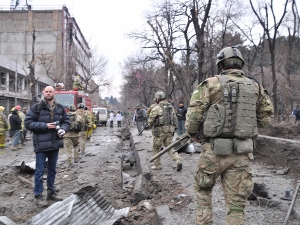

<p><img class=" alignright size-full wp-image-742" src="http://schoolnewsnz.fastrackdev.com/wp-content/uploads/2014/03/SND01_-_4_-_NWS_-_Doco__300x225.jpg" alt="SND01 - 4 - NWS - Doco 300x225" style="margin: 5px; float: right;" width="300" height="225" />The award-winning documentary He Toki Huna: New Zealand in Afghanistan (2013) is set to be taught to hundreds of New Zealand secondary school students, giving them an important background and analysis of our role in the controversial war beyond that offered by the mainstream media.</p>
<p> <!--more--> </p>
<p>Professor Goldson, head of Media, Film, and Television at the University of Auckland, produced and directed He Toki Huna with her colleague Kay Ellmers of Tumanako Productions. The documentary uses independent journalist Jon Stephenson&#8217;s reportage on the ground in Afghanistan as its spine, but includes a broad range of voices including solders and military leaders, journalists, academics and local Afghan community leaders in Bamiyan and Kabul.</p>
<p>He Toki Huna (loosely translated as &#8216;the hidden adze&#8217;) asks a series of simple questions that have complex answers: Why did we go to Afghanistan? What did our troops actually do there? And why did we hear so little about our involvement, given this was our longest war?</p>
<p>Professor Goldson has been assisted by a $5000 grant from the Peace and Disarmament Education Trust (PADET) to distribute the film to secondary schools around the country for their free use. PADET was established from money received by the New Zealand Government from France as compensation for the damage suffered as a result of the attack on the Greenpeace &#8216;Rainbow Warrior&#8217; ship in Auckland Harbour on July 10, 1985.</p>
<p>The film is being sent to schools&#8217; history, English and media studies departments along with an accompanying study guide which is also mounted on the film&#8217;s website <a href="http://www.nzinafghanistan.com" target="_blank">www.nzinafghanistan.com</a> . Prof. Goldson engaged Alex Edney-Browne, a student completing her BA in media, film and television and politics, to write the guides, which were tailored to the NCEA guidelines. Alex was ideal, Prof. Goldson says, given she remembers her experience as a Year 12 and 13 student, but has learnt strong analytical skills in media, politics and journalism studies through her time at university.</p>
<p>&#8220;We know teachers are very busy,&#8221; Professor Goldson says. &#8220;We tried to make the DVD and study guides &#8216;plug and play&#8217; so the package fits readily into the NCEA curriculum. We hope it will be helpful for all students who engage with issues vital to Aotearoa New Zealand, but particularly those planning a career in the military, government service or journalism.&#8221;</p>
<p>Prof. Goldson and collaborator James Brown won Best Editor for He Toki Huna at last year&#8217;s Rialto Channel Film Awards. The film was also nominated for Best Documentary, Best Director and Best Camera at the awards, also affectionately known as &#8216;the Moas&#8217;.</p>
<p>Originally commissioned by Maori Television and funded by New Zealand on Air, with an initial version screening on the eve of Anzac Day, the film was significantly expanded from its broadcast length into an 80-minute feature. It then screened throughout New Zealand at the International Film Festival, premiering in Auckland at Sky City Theatre, garnering critical praise for its intelligence, insight and balance. The film was also a finalist for &#8216;Best Factual Script&#8217; in the Script Writer Awards of New Zealand earlier this year.</p>
<p>He Toki Huna: New Zealand in Afghanistan was funded through NZ on Air and Maori Television Service with generous support from the University of Auckland and assistance from the New Zealand Film Commission&#8217;s Feature Film Finishing Grant</p>

Since 2015, fewer students are completing secondary school, defined as remaining enrolled in education until…
As the country’s Indian population grows, so does demand for Indian languages like Hindi, Punjabi…
By promoting alternate qualifications, some schools may have undermined public trust in NCEA, explains an…
When young people immerse themselves in nature, they leave feeling physically, mentally, emotionally and spiritually…
Theatre is much more than performance. Deep skills can be developed across multiple curriculum areas,…
NZCER found generative AI tools are frequently used to support teaching and learning in primary…
This website uses cookies.